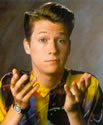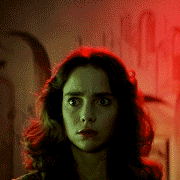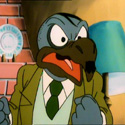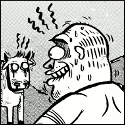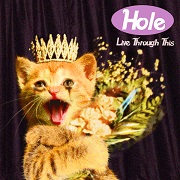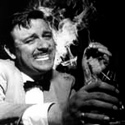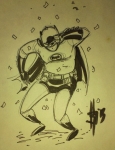|
Alternatively, if you are less inclined to extreme anal-retentiveness, read what you feel like reading when you feel like reading it. Sometimes I want a break from fiction so guess what I do! I read a non-fiction book! It works the other around too. Try it out maybe.
|
|
|
|

|
| # ? May 10, 2024 00:23 |
|
Since the poster asked about organizing their to-read list, I kind of assumed they were interested in an idea beyond just "pick something." I'm absolutely anal-retentive about it, but it's what I got to after about three years of experimenting. I spend maybe twenty minutes a week poking around in my book list, and it's saved me time and frustration. I guess some people's brains are just more detail-oriented than mine (or maybe I'm just getting old), but I used to forget recommendations, miss releases from authors I like, and accidentally buy new editions of books I already owned because the cover was different. I'm enjoying what I read more because I always have a list of the things that I'm definitely interested in, rather than just browsing and picking something based on the blurb and a quick skim of the first few pages.
|
|
|
|
I use some basic calculus formulas combined with the output of a constantly running random number generator to let me know which piece of writing I should point my eyes at next.
|
|
|
|
I'm finishing up the first book of The First Law trilogy. I can't decide whether to keep going and plow through books 2 and 3, or read something else for a change of pace in between. What would you do?
|
|
|
|
Parker Lewis posted:What would you do? The past couple years I've been slotting in other books to avoid reading a series all in one go.
|
|
|
|
Parker Lewis posted:I'm finishing up the first book of The First Law trilogy. I can't decide whether to keep going and plow through books 2 and 3, or read something else for a change of pace in between. What would you do? I, however, read it all in one go and loved it.
|
|
|
|
I'm reading them right now too and was planning on splitting them up, but I enjoyed the first one so much that I dove right into the second, and will probably do the same for the third.
|
|
|
|
Parker Lewis posted:I'm finishing up the first book of The First Law trilogy. I can't decide whether to keep going and plow through books 2 and 3, or read something else for a change of pace in between. What would you do? I'm currently looking for a change in between the 2nd and 3rd book. I was very disappointed with how the second book ended up and found myself not caring anymore about how the book will wrap itself up in the final third. The second book does absolutely nothing to advance the main plot forward the way I saw it.
|
|
|
|
As a kid, I loved books and read a million of them. However, once I got to college, most of my time was spent reading science textbooks or very dense journal articles. I read to obtain the largest amount of information in the shortest time possible, and never had time to read for pleasure. I graduated in June and started a job. Now, when I come home from work, I actually have time to sit down with a book, and it has been AWESOME! I had to reteach myself to read rather than scan for information, but that was an easy hump to get over. I had forgotten the joy of reading a good story and using my imagination. The images I have in my mind of places or people I have read about are extremely vivid in a way that's not possible with movies or TV. And I can do it all for free through the library! I love reading and am so glad to be back.
|
|
|
|
Is it unique to Sun Also Rises, or does Hemingway always write like a 9th grade ESL student?
|
|
|
|
flavaaDAAAAAVE posted:Is it unique to Sun Also Rises, or does Hemingway always write like a 9th grade ESL student? It's always that way. I don't like it either, but I guess the world needed the drunken toddler writing style back then.
|
|
|
|
Well, the thing with Hemingway's style is that he cut his chops writing for newspapers where editors would cut out all the unnecessary words. As a result, he has a really terse, tight style. When I was in journalism school, we studied his short stories for that reason.
|
|
|
|
So I'm getting ready to start in on a reread of The Corrections. I first read it when I was stupid and like 13 or 14, and liked it probably about as much as a young teenager who thinks hosed up family dynamics are intrinsically fascinating could. Still, I'm sure I missed a lot. I remember that back when it first came out everyone was acting like it was the second coming of Jesus-in-book-form or something, though it was also hyped all to hell with the Oprah Book Club bullshit. Basically I am asking if this book is actually as good as people were saying it was, and if a reread now will be beneficial, because if not, I've got plenty of other backlog to work through.
|
|
|
|
drat poysky closed his thread. I wanted to read more of his novel.
|
|
|
|
I'm reading Notes from Underground and I ran into this sentence: "Though these German beavers soon grow shabby and look wretched, yet at first they look exceedingly well, and I only needed it for one occasion." (He's talking about the collar on his jacket and he needs one that looks better for when he challenges an officer.) Shouldn't it be that the beavers (skins) look exceedingly good? flavaaDAAAAAVE fucked around with this message at 16:56 on Aug 11, 2010 |
|
|
flavaaDAAAAAVE posted:I'm reading Notes from Underground and I ran into this sentence: "Though these German beavers soon grow shabby and look wretched, yet at first they look exceedingly well, and I only needed it for one occasion." You'd probably want to check to original German, but "well" is fine if it means "in good health," which would fit if "wretched" is the proper translation - the whole thing could just be a metaphor about "sickness/health." And depending on how old the translation is, "well" might just be used for anything like that - grammar changes over time, especially in ambiguous situations where the question is "Does this modify the verb or the subject? If it modifies the subject, in what sense?" etc etc.
|
|
|
|
|
I need a concise book of the rules of grammar geared towards adults. Any suggestions?
|
|
|
flavaaDAAAAAVE posted:I need a concise book of the rules of grammar geared towards adults. Any suggestions? You're going to have to be a lot more specific to get anything useful. First, which language are you talking about? Are you trying to learn how to speak a new language? Write in it? Are you learning how to write in English? Are you a native English speaker wanting to write well? (The classic/standard for that last one is Strunk and White's "The Elements of Style.")
|
|
|
|
|
If you need a desk grammar reference, Rules for Writers will likely cover most of what you're looking for. I have the fourth edition but apparently there are now six. It's not as prescriptive as some other grammars I've used, which I like.
|
|
|
|
This probably has a simple explanation, buy why does Edgar Allan Poe use only the first letter of certain proper nouns, excluding the rest with a dash? For example...quote:"Ah, if I had only known you were here!" said Legrand, "but it's so long since I saw you; and how could I foresee that you would pay me a visit this very night of all others? As I was coming home I met Lieutenant G——, from the fort, and, very foolishly, I lent him the bug; so it will be impossible for you to see it until the morning. Stay here to-night, and I will send Jup down for it at sunrise. It is the loveliest thing in creation!"
|
|
|
Jive One posted:This probably has a simple explanation, buy why does Edgar Allan Poe use only the first letter of certain proper nouns, excluding the rest with a dash? For example... Lots of authors from many periods use this. Sometimes it's just out of "laziness," but usually it's because the character may be based off of a real person, or the use of the name may offend someone with that name, and publishers could get thrown in jail or shut-down if it offended the wrong person. It's just self-censorship, usually.
|
|
|
|
|
A lot of writers from that time did it. I believe it's so that the reader will take it as though it's a memoir and anyone reading it at the time would know who the characters are and how scandalous their involvement in the story would be. If you don't like it, think of them as Mr X, Ms Y and so on. From E/N.
|
|
|
|
Jive One posted:This probably has a simple explanation, buy why does Edgar Allan Poe use only the first letter of certain proper nouns, excluding the rest with a dash? For example... Apart from whether or not obviously enigmatic scribal practices actually conceal anything, they certainly lend a sense of veracity to a piece of fiction. When Camus opens The Plague with, "The unusual events described in this chronicle occurred in 194- at Oran," the novel takes on a sly air, making no effort to hide its concealment of identifying data. Camus even uses the word chronicle instead of novel, which I'd argue heightens the sense of a reporter respecting source anonymity, while publishing the truth. Ploys of verisimilitude in fiction go back a long way. In Moll Flanders (1722), Defoe begins the novel by having Flanders state: quote:The author is here supposed to be writing her own history, and in the very beginning of her account she gives the reasons why she thinks fit to conceal her true name, after which there is no occasion to say any more about that. quote:I do not pretend, in giving you the history of this Royal Slave, to entertain my reader with adventures of a feigned hero, whose life and fortunes fancy may manage at the poet's pleasure; nor in relating the truth, design to adorn it with any accidents but such as arrived in earnest to him: and it shall come simply into the world, recommended by its own proper merits and natural intrigues; there being enough of reality to support it, and to render it diverting, without the addition of invention. Or consider the most famous piece of fiction, the Bible, 
|
|
|
|
The New Yorker has a pretty good piece on the topic of "histories" and the novel.
|
|
|
|
reflir posted:I read the first 50 pages of Iain Banks' new book, Transition, got bored and quit. Does it get better? The only other book of his I've read was the Wasp Factory which I greatly enjoyed, but this is just not that. Just following up what someone else said about Iain Banks, in that the early books were generally more enjoyable. I liked The Crow Road, Complicity and Whit, but other ones I've tried, such as The Business and Dead Air were pretty dull. His science fiction novels (where he has an M in the middle) are generally fairly well regarded, but aren't my cup of tea at all. But basically, he hasn't topped The Wasp Factory and on current form, is never likely to.
|
|
|
|
Kind of retarded and not really work-safe, but I still laughed.
|
|
|
|
DirtyRobot posted:The New Yorker has a pretty good piece on the topic of "histories" and the novel. I wanted to enjoy that article because the subject is interesting but I just found it frustrating. I don't get why Lepore does seemingly sloppy stuff like naming Richardson's novels right before dropping the “Novel Reading, a Cause of Female Depravity” quotation; those novels were practically prescriptive antidotes to that "depravity," so contrasting them with the morals-improving "real histories" is kind of weird--especially when she's brought up the more subversive Fielding and Defoe stuff earlier. And by the end of the piece there's an unanticipated emphasis on the way the role of female writers connected to the history/fiction schism, an idea that is explored without much focus or conclusion--largely within an 18th/19th century bubble--and which is badly incorporated and appears out of nowhere 3/4s of the way into the article. Also, I find this sort of thing obnoxious: "...as if Robinson Crusoe’s journal were as much a gimmick as Esquire’s “diary” of Heath Ledger."
|
|
|
|
Pompous Rhombus posted:Kind of retarded and not really work-safe, but I still laughed. Girls and books
|
|
|
Facial Fracture posted:I wanted to enjoy that article because the subject is interesting but I just found it frustrating. I don't get why Lepore does seemingly sloppy stuff like naming Richardson's novels right before dropping the “Novel Reading, a Cause of Female Depravity” quotation; those novels were practically prescriptive antidotes to that "depravity," so contrasting them with the morals-improving "real histories" is kind of weird--especially when she's brought up the more subversive Fielding and Defoe stuff earlier. I don't know, the article seemed like a very good introduction to the discourse in 18th-century literature for a popular audience, and as a phd student with that specific field focus, I would hope I'd be able to judge. WRT Pamela and Clarissa, you should remember that a lot of critics denounced the books as essentially pornography, especially Pamella, with it's lurid plot. Just because a book proclaims it's morality, even sincerely, doesn't mean it always shuns the prurient interests - lots of films, news, and magaine articles do this now, and back then, a lot of the daily and weekly papers did it as well. As for the gender thing, I agree that the transition was bad, but it is an integral part of understanding the aesthetics of history/histories, and I'm glad Lepore brings it up. And I also agree on the choice of the Esquire "diary" being in poor taste, but not the use of contemporary magazine writing as a comparison, since magazines produced a huge amount of great literature in the period, especially Blackwood's. 7 y.o. bitch fucked around with this message at 05:03 on Aug 19, 2010 |
|
|
|
|
I recall a quote about oral sex I read somewhere. I thought it was attributed to John Updike, but I'm not sure. Paraprasing, it goes like, "it is even more intimate than intercourse, because how special is it that the brain is in such proximity to the sex organ?" I hope this is a real thing instead of something I completely constructed out of thin air.
|
|
|
|
So I picked up Drood by Dan Simmons at the bookstore partially because of the evil looking silhouette on the cover. I've known about it having plenty of mixed reviews but I really liked the name/cover of the book. What did goons think of it?
|
|
|
|
There used to be a Simmons/Drood thread, but it apparently hit the archives. I haven't read Drood because Simmons's historical fiction tends to be ponderous and pretentious (his older stuff is just pretentious, but that doesn't mean I don't like him). He spends pages and pages mapping out character psychologies and historical info, but he also throws in monsters, so nothing feels fully explored or utilized and nothing really comes together in the end. He wants to be "Henry James... but with murderous creatures!" and it doesn't work out so well. Of course, this is all based on The Terror, which was not without its good bits, but the sum was less than its parts, so to speak. I heard similar criticisms about Drood, that it's overlong and it never really jives, which is a shame since Wilkie Collins going on opium binges and hallucinating Charles Dickens tracking serial killers sounds like a recipe for fun if I've ever heard it. (Of course, Simmons recently came out with Black Hills, which is yet more supernatural horror/historical fiction, though it's shorter and so maybe lightens some of the faults of the longer-form stuff.)
|
|
|
|
Dan Simmons is really hit or miss: some of his stuff is amazingly good, some of it's amazingly bad. I've avoided Drood because I don't want to read The Mystery of Edwin Drood since it's unfinished and I'll never know who dunit =(
|
|
|
|
|
7 y.o. bitch posted:I don't know, the article seemed like a very good introduction to the discourse in 18th-century literature for a popular audience, and as a phd student with that specific field focus, I would hope I'd be able to judge. WRT Pamela and Clarissa, you should remember that a lot of critics denounced the books as essentially pornography, especially Pamella, with it's lurid plot. Just because a book proclaims it's morality, even sincerely, doesn't mean it always shuns the prurient interests - lots of films, news, and magaine articles do this now, and back then, a lot of the daily and weekly papers did it as well. I thought the article was interesting but it seemed a bit disorganized and I wasn't totally sure on what overall point(s) Lepore was trying to make. It seems like maybe she was constrained by a directive to be "topical" (hence the kinda awkwardly-inserted references to the Esquire fake diary and the fake gangland memoir), and also by the length of the article (it was a short space in which to provide a history of the issue, give an informed go-along history of women's roles in it, and plug in very recent points of reference). Every time she introduced an idea or an example she didn't seem to have the room to say much about it, and then it was (sometimes abruptly, like with the gender stuff) on to the next thing. That was frustrating. I didn't know that Richardson's stuff was denounced as pornography when it was written though, so I take back my criticism of what I thought was an iffy comparison. Everything I've read (which mostly comprises introductions to the novels and similar stuff from period anthologies--not scholarly stuff) has focused mainly on contrasting Richardson's harping on chastity with Fielding's "bawdy" satires. So the sense I've got of its reception has definitely been coloured by that.
|
|
|
|
Pompous Rhombus posted:Kind of retarded and not really work-safe, but I still laughed. Real nerds would have picked Bester or Ellison
|
|
|
|
Right there is no way to right that with out sounding like a sperg but I need some help so i am just going to throw this out there then go hide myself in shame. I keep having trouble organizing my book shelf. I have it divided up into genres, but not alphabetically. Instead I put my favorites at the top and ones I don't like that much at the bottom the bottom. The sorting them in to genres is getting to be a problem though. If it is a book that has a wizard in space is it sci/fi or fantasy? Does a book that has aliens showing up in World War II go in alternate history or sci/fi? Should alt history even have it's own sub-section? Then there are just standard literature novels. Do I just cram them in on one case or do I try to sort them? The biggest problem though is that I will have everything where I want it, but then I get a new book that won't fit in were I want to put it so I have to rearrange everything. This happens way to often. So how do you other bibliophiles sort your collection?
|
|
|
|
Cap. Monocle posted:Right there is no way to right that with out sounding like a sperg but I need some help so i am just going to throw this out there then go hide myself in shame.
|
|
|
|
One row genre, one row respectable fiction, one row non-fiction (split between a foreign language resources section and regular English non-fiction section). I alphabetize each row.
|
|
|
|
I sort mine chronologically, so from earliest date to latest. If two books were published the same year, I try to find out the exact date, and luckily I haven't had two published at the exact same time (yet!). If a book existed in manuscript form at a substantially earlier date than when it was published (ie., it was only later intended to be published), then I copy out in handwriting the book and place the manuscript version in its proper position and the printed one in another place. For the manuscript, I usually try to get the paper correct, so for, like, ancient material, I'll write it on a scroll in papyrus, or for medieval material, usually on vellum, although purple vellum is too expensive for me. Maybe chronology will work for you! Or maybe you could figure out whether it's fantasy or sci-fi based on when the events in the book take place. So if it's a wizard from earth who uses a rocket ship to fly to Mars or something, obviously that's the future, so it'd be sci-fi. But if the wizard just happened to live on a radically advanced planet, but in the past, then that'd be fantasy.
|
|
|
|
|

|
| # ? May 10, 2024 00:23 |
|
Thanks guys. These gave me some good ideas. Not going to be copying anything onto vellum though.
|
|
|








